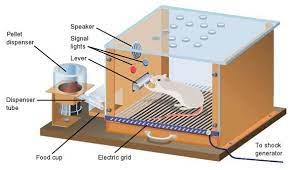INTERMEDIATE/ADVANCED LESSON (Caffeine)
English Reading & Vocabulary Lessons
Lesson 1 (60 minutes)
-
-
5 minutes Conversation and discussion
-
30 minutes: Reading
-
20 minutes Writing
-
5 minutes Conversation, Text Correction and discussion
-
Read the text below then answer the questions below:
Operant Conditioning
Operant conditioning is a process by which humans and animals learn to behave in such a way as to obtain rewards and avoid punishments. It is also the name for the paradigm in experimental psychology by which such learning and action selection processes are studied.
VACABULARY: paradigm, avoid, rewards
WHAT IS OPERANT CONDITIONING?
The behavior of all animals, from protists to humans, is guided by its consequences. The bacterium finds its way, somewhat inefficiently, up a chemical gradient; the dog begs for a bone; the politician reads the polls to guide his campaign. Operant conditioning is goal-oriented behavior like this.
These examples are instances of ontogenetic selection, that is guidance by consequences during the life of the individual. Other names for ontogenetic selection are instrumental or operant (B. F. Skinner’s term) conditioning.
VOCABULARY: behaviour, guided, bacterium, inefficiently, gradient, begs, polls, goal-orientated
Closely related to, and often thought to be a component of, operant conditioning is classical or Pavlovian conditioning. The prototypical example of Pavlovian conditioning is of course Pavlov and his dogs. In Pavlovian conditioning, the repeated pairing of a stimulus such as Pavlov’s bell to an affectively important event like the receipt of food, leads to the anticipatory elicitation of what is termed a conditioned response, such as salivation, when the bell is sounded. Unlike operant conditioning, in classical conditioning no response is required to get the food.

The distinction between Pavlovian and operant conditioning therefore rests on whether the animal only observes the relationships between events in the world (in Pavlovian conditioning), or whether it also has some control over their occurrence (in operant conditioning). Operationally, in the latter outcomes such as food or shocks are contingent on the animal’s behavior, whereas in the former these occur regardless of the animal’s actions. However, the distinction between these two paradigms is more than technical — in Pavlovian conditioning, changes in behavior presumably reflect innately specified reactions to the prediction of the outcomes, while operant learning is at least potentially about maximizing rewards and minimizing punishment. Consequently, Pavlovian and operant conditioning can differ in the behaviors they produce, their underlying learning processes, and the role of reinforcement in establishing conditioned behavior. The scientific study of operant conditioning is thus an inquiry into perhaps the most fundamental form of decision-making. It is this capacity to select actions that influence the environment to one’s subjective benefit, that marks intelligent organisms.
Skinners rat box experiment
VOCABULARY: clatter, occurence, component, prototypical, repeated, pairing, bell, salivation, whether, presumably
There is also phylogenetic selection – selection during the evolution of the species. Darwin’s natural selection is an example and behavior so evolved is often called reflexive or instinctive. Much reproductive and agonistic (aggressive/defensive) behavior is of this sort. It emerges full-blown as the animal matures and may be relatively insensitive to immediate consequences. Even humans (who should know better!) are motivated to sexual activity by immediate gratification, not the prospect of progeny, which is the evolutionary basis for it all.
The selecting consequences that guide operant conditioning are of two kinds: behavior-enhancing (reinforcers) and behavior-suppressing (punishers), the carrot and the stick, tools of parents, teachers – and rulers – since humanity began. When the dog learns a trick for which he gets a treat, he is said to be positively reinforced. If a rat learns to avoid an electric shock by pressing a lever, he is negatively reinforced. There is often ambiguity about negative reinforcement, which is sometimes confused with punishment – which is what happens when the dog learns not to get on the couch if he is smacked for it. In general, a consequence is called a reinforcer if it strengthens the behavior that led to it, and it is a punisher if it weakens that behavior.
VOCABULARY: instinctive, species, reflexive, lever, trick, ambiguity, couch, reinforcer, weakens, punisher
HISTORY
What happens during operant conditioning? In Thorndike’s original experiments the experimenter simply put the animal, a cat, into a puzzle box ( Figure 1) from which it could escape by making some arbitrary response such as pushing a pole or pulling a string. The experimenter intervened no further, allowing the animal to do what it would until, by chance, it made the correct response. The result was that, according to what has sometimes been called the principle of postremity, the tendency to perform the act closest in time to the reinforcement – opening of the door – is increased. This observation was the origin of Thorndike’s law of effect.
VOCABULARY: puzzle, intervened, according
FINALLY:
Finally, it is Interesting in this respect that even very simple animals show some kind of operant and classical conditioning. A recent study purported to show discrimination learning in the protist Paramecium for example; and certainly a simple kind of operant behavior, if not discrimination learning, occurs even in bacteria. Thus, the essentials of operant conditioning need not depend on specific neural structures. On other hand, neural networks are powerful computing devices and some neurally based theories now embrace a wide range of experimental data, matching rat behavior well and rat neurophysiology, at least at a gross-anatomy level, reasonably well.
VOCABULARY: purported, discrimination, protist, embrace, matching
Writing: 150 words.
After reading the text can you think of an example where you have experienced operant conditioning in an animal? Describe the experience.
In your writing please include examples of comparatives and superlatives in English.
Use this link to do your writing exercise and then send it to me.
